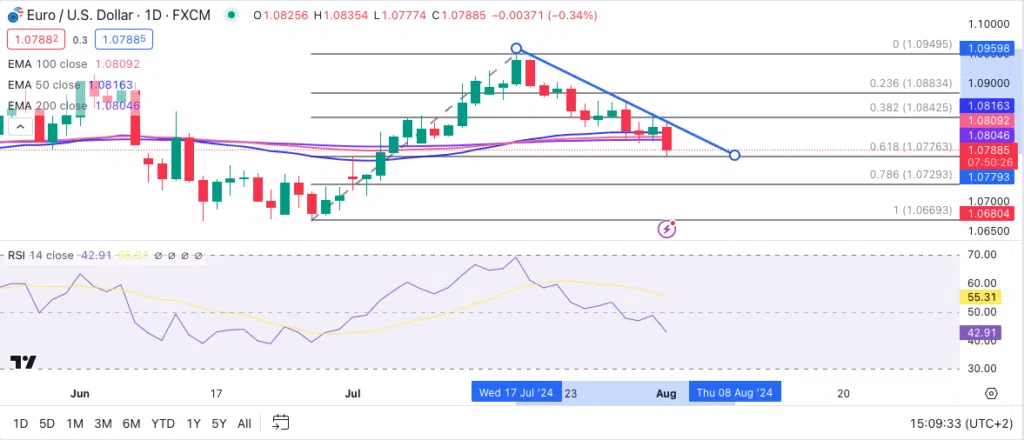-
Best Forex Brokers
Our top-rated Forex brokers
-
Brokers for Beginners
Start trading here
-
Forex Demo Accounts
Learn to trade with no risk
-
ZAR Trading Accounts
Save on conversion fees
-
Lowest Spread Brokers
Raw spreads & low commissions
-
ECN Brokers
Trade with Direct Market Access
-
No-deposit Bonuses
Live trading with no deposit
-
High Leverage Brokers
Extend your buying power
-
Islamic Account Brokers
Best accounts for Muslim traders
-
Market Maker Brokers
Fixed spreads & instant execution
-
All Trading Platforms
Find a platform that works for you
-
TradingView Brokers
The top TradingView brokers
-
MetaTrader4 Brokers
The top MT4 brokers in SA
-
MetaTrader5 Brokers
The top MT5 brokers in SA
-
cTrader Brokers
The top cTrader brokers in SA
-
Forex Trading Apps
Trade on the go from your phone
-
Copy Trading Brokers
Copy professional traders
With unemployment rising and inflation returning to the Federal Reserve’s 2% target, Jerome Powell, Chairman of the Federal Reserve, gave the clearest signal yet that the Fed was preparing for a 25-basis point cut in September.
“The second quarter’s inflation readings have added to our confidence and more good data would further strengthen that confidence… a reduction in our policy rate could be on the table as soon as the next meeting in September.” Powell said.
“He’s sending the signal as many ways as possible that unless something dramatic happens between now and September, they will begin cutting rates at that meeting by a quarter point,” said Bob Michele, chief investment officer at JPMorgan Asset Management.
While the dollar, as represented by the DXY index, slumped in the immediate aftermath of the decision, the downturn was short-lived, given markets had already priced in a September rate cut. Thursday’s trading saw the DXY rebound sharply, and the EUR/USD dropped below the 1.08 handle as traders expressed concern over the strength of the economic recovery in the eurozone.
Inflation in the EU has remained sticky, and eurozone employment and economic growth have recently underperformed market estimates. This presents the European Central Bank with a conundrum: Do they risk further rate cuts—potentially stoking inflation—or hold rates steady, thereby increasing the already high chances of a recession?
Most observers agree that the ECB will continue cutting rates, though the chances of a September rate cut are slimmer than they were a week ago. Analysts at ING remain mildly optimistic, saying:
“Survey data still suggests that the downward trend in inflation is likely to continue. And… at the current level, interest rates still imply restrictive monetary policy. Today’s figures have slightly reduced the probability of a rate cut in September, but there’s still six weeks of data to be seen before the ECB has to make a decision.”
EUR/USD Traders will be keeping an eye on US manufacturing data due out today and the NFP tomorrow, but don’t expect any major moves around these two data releases unless there’s a huge surprise. Given the high probability of a US rate cut in September and the uncertainty in the EU, the price of the EUR/USD will likely remain dependant on EU data, rather than events in the US.
A word of warning: This paradigm could change very quickly should the conflict in the Middle East escalate. Gold and oil prices have risen sharply, and the risk-on effect could easily lead to a stronger USD if tensions boil over.
Technical Analysis
The EUR/USD trades just below the confluence of the 50-day (blue), 100-day(pink), and 200-day (purple) Exponential Moving Averages (EMAs) at the 1.0795 level. Having tested the 61.8% Fibonacci retracement level (of the June – July 2024 uptrend) at 1. 0776, earlier in today’s trading session, a close below this level would leave the pair vulnerable to the 1.0750 level, and below that to the 1.0700 psychological handle. At 43.5 and with the appearance of lower moves still, the RSI confirms this downward bias.

Should price break close above the trendline (blue) and the three EMAs at the 1.0820 level, one could expect a move towards the 38.2% Fibonacci Retracement level at 1.0842 and beyond that traders will be eyeing the 1.0900 psychological level.
Stay updated
This form has double opt in enabled. You will need to confirm your email address before being added to the list.




























